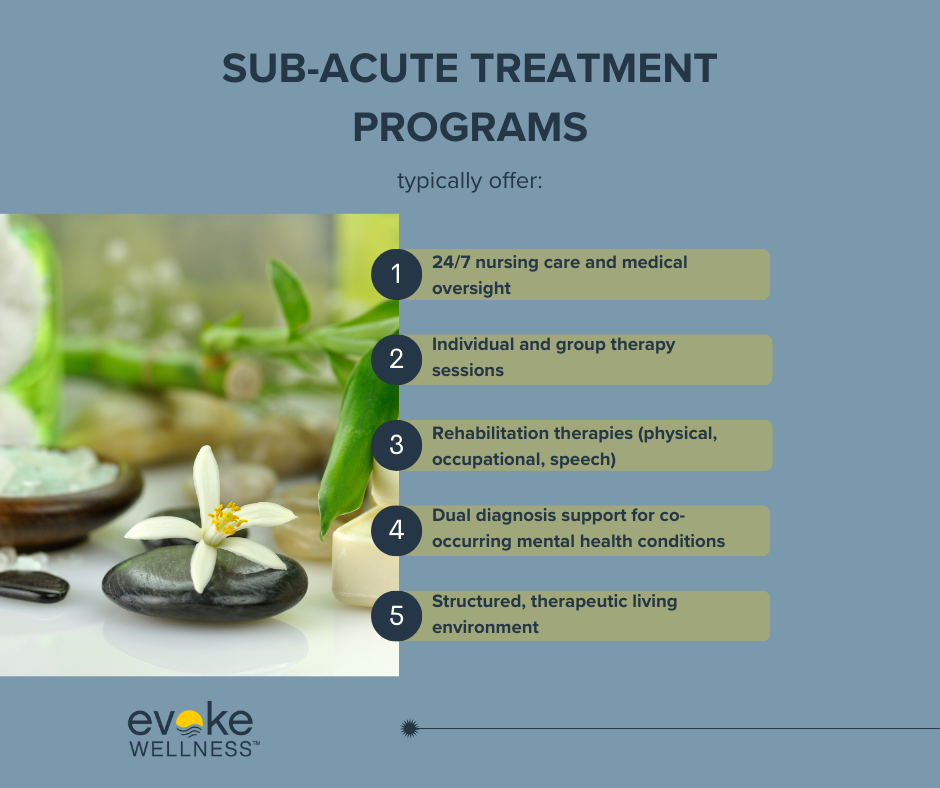Navigating the complexities of addiction treatment can be overwhelming. As you explore options for yourself or a loved one, you may encounter the term “sub-acute treatment services.” But what exactly does this encompass? At Evoke Wellness at Miramar, we understand the importance of clarity in your recovery journey. Sub-acute treatment services offer a comprehensive approach to addiction care, combining medical detox, residential treatment, dual diagnosis support, and various therapy programs. Recent studies show that integrated treatment models like these can significantly improve long-term recovery outcomes. In this article, we’ll demystify sub-acute treatment services, providing you with the knowledge to make informed decisions about your path to wellness.
Together, let’s embrace the journey to recovery and the promise of a new beginning. Call us at (833) 819-6066 today or reach out online.
What is Sub Acute Treatment?
Bridging Gaps in Care
Sub acute treatment, also known as sub acute care or sub acute rehabilitation, is a comprehensive, multidisciplinary program designed to bridge the gap between acute hospital care and either returning home or entering a long-term care facility. It provides an intermediate level of inpatient medical care and therapeutic services.
Key Components
- Skilled nursing care 24/7
- Intensive rehabilitation therapies (physical, occupational, speech)
- Wound care management
- IV therapy and medication management
- Pain management
- Nutritional support
Supporting Recovery
The primary goal is to treat, stabilize, and assist patients in regaining their maximum level of function and independence after an acute illness, injury, or exacerbation of a chronic condition. Research shows that patients receiving sub acute care experience improved outcomes and reduced hospital readmissions compared to those discharged home.
Tailored Programs
Sub acute programs are tailored to each patient’s specific needs, with care plans developed by an interdisciplinary team. Treatment typically lasts 2-4 weeks, with some patients requiring a longer stay depending on their progress and discharge goals. Facilities offer private or semi-private rooms in a more home-like setting.
The Difference Between Acute and Sub-Acute Care
Acute vs Sub-Acute
Acute care refers to treating severe, short-term medical conditions that require immediate intervention. Sub-acute care provides ongoing treatment and rehabilitation for patients who no longer require acute hospital care but still need monitored medical services.
- Acute care examples: emergency surgery, intensive care, trauma treatment
- Sub-acute care examples: stroke recovery, joint replacement rehab, wound care
Treatment Duration
Acute care generally has a shorter duration, often involving a hospital stay of days or weeks until the patient stabilizes. Sub-acute care involves longer treatment plans spanning weeks or months for comprehensive recovery and therapy.
- Average acute care hospital stay: 4.5 days (CDC)
- Average sub-acute rehab stay: 25 days (Medicare data)
Level of Care
Acute care provides active, complex medical treatment by specialized physicians and nurses. Sub-acute facilities offer skilled nursing and therapy services under a physician’s supervision.
- Acute care: intensive medical monitoring, diagnostic tests, complex procedures
- Sub-acute care: physical/occupational therapy, skilled nursing, nutritional support
Cost Comparison
Acute inpatient care is more intensive and costly due to the level of around-the-clock medical services. Sub-acute care is generally more affordable as it provides lower-acuity care.
- Average acute care cost per day: $2,271 (HealthCare.gov)
- Average sub-acute rehab cost per day: $520 (Genworth Cost of Care Survey)
Choosing the right level of care optimizes patient outcomes while managing costs effectively. Sub-acute services provide the critical step-down support many need after acute treatment.
Types of Sub Acute Treatment Services
Medical Detox
- Safe, medically-supervised detox to manage withdrawal symptoms
- 24/7 clinical care and monitoring for substance abuse issues
- Medications to ease discomfort during the detox process
Residential Treatment
- Intensive inpatient program in a therapeutic environment
- Evidence-based therapies like CBT, DBT, and motivational interviewing
- Treatment for co-occurring mental health disorders
Dual Diagnosis Treatment
- Specialized care for those with substance abuse and mental illness
- Integrated approach tackling both issues simultaneously
- Medication management combined with counseling and therapy
Therapy Programs
- Individual, group, and family therapy sessions
- Treatment modalities like art, music, or adventure therapy
- Focus on relapse prevention and coping strategies
According to a 2020 study, over 19 million U.S. adults battled a substance use disorder. Comprehensive sub acute care improves recovery outcomes for this vulnerable population. With personalized treatment plans and a range of evidence-based services, these programs provide the tools for lasting sobriety.
Choosing the Best Sub Acute Treatment Facility
Evaluate Accreditations and Certifications
One of the most crucial factors when selecting a sub acute treatment facility is ensuring it meets industry standards and is accredited by reputable organizations. Accreditations like the Joint Commission or CARF (Commission on Accreditation of Rehabilitation Facilities) signify the facility adheres to rigorous quality and safety protocols. Accredited facilities provide evidence-based care and maintain high levels of staff training and professionalism.
Assess Treatment Approach and Specialties
Every individual has unique needs when it comes to addiction treatment. Research the facility’s treatment approach to ensure it aligns with your specific requirements. Look for programs that offer a comprehensive range of services, including medical detox, individual and group therapy, family counseling, and holistic therapies like yoga and mindfulness. Specialized tracks for populations like veterans, LGBTQ+ individuals, or those with co-occurring mental health disorders can also be beneficial.
Consider Amenities and Environment
The physical environment of a treatment facility can significantly impact the recovery process. Tour the facility to assess the living accommodations, recreational areas, and overall atmosphere. A comfortable, safe, and supportive environment can foster healing and personal growth. Reputable facilities often provide amenities like nutritious meals, fitness centers, and outdoor spaces to promote holistic well-being.
Evaluate Aftercare and Alumni Support
Recovery is an ongoing journey that extends beyond the initial treatment program. A strong aftercare and alumni support system can be invaluable in maintaining sobriety and preventing relapse. Inquire about the facility’s aftercare offerings, such as outpatient services, sober living arrangements, and alumni events or support groups. Ongoing support can provide accountability, community, and resources to navigate the challenges of long-term recovery.
By carefully evaluating these factors, you can make an informed decision and select a sub acute treatment facility that aligns with your needs and goals, increasing your chances of achieving lasting recovery.
What to Expect During Sub Acute Treatment
A Transitional Phase
Sub-acute treatment serves as a crucial bridge between intensive inpatient care and outpatient therapy, helping individuals continue their recovery journey. This transitional phase aims to equip patients with the necessary skills to cope with cravings, prevent relapse, and facilitate a smooth reintegration into their daily lives.
Personalized Care
During sub-acute treatment, patients can expect a personalized approach tailored to their unique needs. They’ll receive a combination of individual and group therapy sessions, along with access to medical and psychiatric care as required. This comprehensive care ensures a holistic approach to recovery.
Structured Environment
The sub-acute treatment environment is designed to provide a structured daily routine while gradually allowing patients to take on more responsibility and independence. This structured schedule may include therapy sessions, educational workshops, recreational activities, and opportunities for social interaction.
Medication Management
Medication management is a crucial component of sub-acute treatment. Healthcare providers work closely with patients to ensure proper medication adherence and monitor any potential side effects. This collaborative approach ensures safe and effective withdrawal from substances like opioids or benzodiazepines.
Family Involvement
Family involvement is often encouraged during sub-acute treatment, as it plays a vital role in supporting the patient’s recovery journey. Opportunities for family therapy and education can help loved ones better understand the challenges of addiction and learn how to provide a supportive environment.
Transition to Outpatient Care
The length of sub-acute treatment can vary depending on the individual’s progress and needs, typically lasting several weeks to a few months. Upon successful completion, patients are better equipped to transition to outpatient care, armed with the necessary coping mechanisms and support systems to maintain long-term recovery.
By providing a structured yet less restrictive environment, sub-acute treatment empowers individuals to regain control over their lives, improve their mental health, and reduce the risk of relapse, ultimately laying a solid foundation for lasting recovery.
Frequently Asked Questions About Sub Acute Treatment Services
What is sub-acute treatment?
Sub-acute treatment services are a level of care that falls between inpatient hospitalization and outpatient treatment, providing more intensive support than outpatient but less than a full inpatient program. According to Evoke Wellness at Miramar, this may include intensive outpatient programs (IOPs), partial hospitalization programs (PHPs), or residential treatment programs.
Who needs sub-acute treatment?
Sub-acute treatment is often recommended for individuals who have completed an inpatient program but still require a higher level of support than traditional outpatient care. It can also benefit those who may not need full hospitalization but require more intensive services than standard outpatient treatment can provide.
What services are offered?

How much does it cost?
The cost of sub-acute treatment can vary depending on the specific program, length of stay, and the patient’s insurance coverage. Many treatment providers work with patients to explore financial assistance options to make care more accessible. Evoke Wellness at Miramar notes that admission often involves verifying insurance coverage and understanding any out-of-pocket costs.
How long does it last?
The length of sub-acute treatment can range from a few weeks to several months, depending on the individual’s progress and goals for regaining independence and function. The treatment team continually assesses the patient’s needs to determine the appropriate duration of care.
Conclusion
In conclusion, sub-acute treatment services offer a crucial step in the recovery journey, bridging the gap between acute care and long-term sobriety. By providing a structured environment that includes medical detox, residential treatment, dual diagnosis care, and comprehensive therapy programs, these services address the complex needs of individuals struggling with substance use disorders. Recent studies have shown that patients who engage in sub-acute treatment have significantly higher rates of long-term recovery success. As you consider your options for addiction treatment, remember that sub-acute care can provide the intensive support and personalized attention necessary to build a strong foundation for lasting recovery. Take the first step towards a healthier future by exploring the sub-acute treatment services available to you today.
Begin Your Journey with Evoke Wellness at Miramar
If you or a loved one is considering treatment, Evoke Wellness at Miramar invites you to contact us. Our compassionate team is ready to answer your questions, discuss your needs, and help you take the first steps toward recovery. In Miramar, you’ll find more than just a treatment program – you’ll discover a community dedicated to your wellness and success. Together, let’s embrace the journey to recovery and the promise of a new beginning. Call us at (833) 819-6066 today or reach out online.


